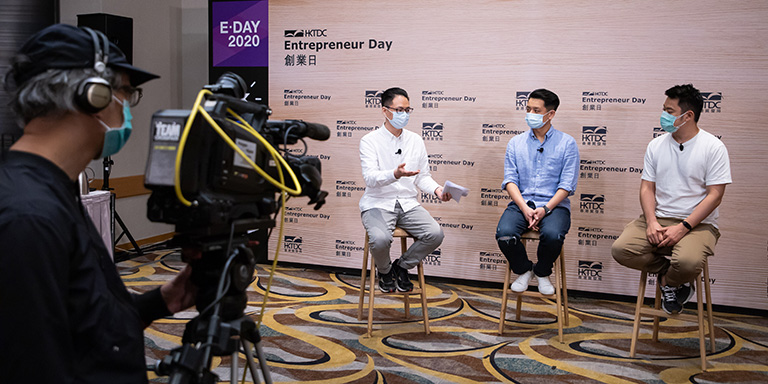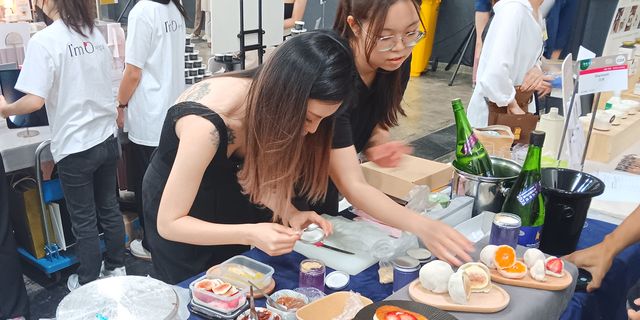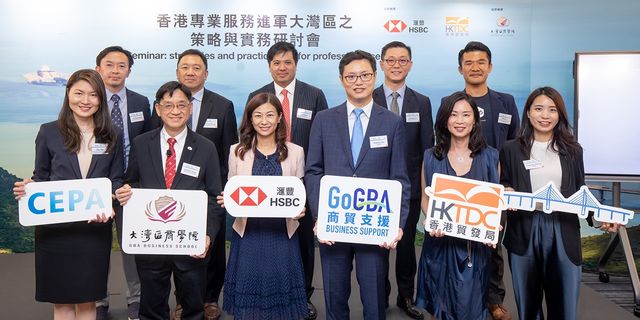Having spent decades growing into its role as one of the world’s financial capitals, with big, mature firms, Hong Kong has recently turned into a nursery for nimble young start-ups. As a densely populated city with many well-educated, energetic young people seeking an outlet for their energy, there is plenty of opportunity for enterprises which can link the mature, risk-averse and fund-rich firms with the adventurous, innovative youngsters.Underlining this merging of the mature and the young, the Hong Kong Trade Development Council (HKTDC) has needed to think on its feet this year as the COVID-19 pandemic prevented attendees travelling to its exhibitions and conferences. The HKTDC successfully moved many of its events online – these included seminars of the 12th HKTDC Entrepreneur Day (E-Day), which were held online on Thursday 16 July and Friday 17 July.
Innovation hub

Green shoots meet hardwood
Panellists frequently returned to the point that, given Hong Kong’s population density and culture, it is comparatively easy to meet and connect with people. Hong Kong’s mature business environment also means there are opportunities for partnerships between established enterprises and aspiring start-ups. These are win-win arrangements since enterprises benefit from the innovation and adaptability of start-ups, while start-ups benefit from the resources and networks of established enterprises.
Navigating the enterprise network

Corporate innovation hubs such as Explorium mitigate the risk that experimentation can present to large enterprises but it can also provide opportunities for start-ups to grow, and also for successful solutions to “spread” across the enterprise.The session also featured Explorium’s client Chain of Demand, a Hong Kong-based predictive analytics start-up whose operations are supported by artificial intelligence (AI) and big data. CEO & Founder AJ Mak explained how his business was able to grow through Explorium not only with one project, but also others thanks to referrals within in the enterprise after earning trust.Talking to Mr Chen, Mr Mak recalled the initial process: “The first thing that we did is get to know each other better and after you knew more about what we did, you found the right person for us to get in touch with to start a pilot.“So, the very first step of the pilot – I think one of the most important steps – is to identify the business problem clearly, in a way that makes sense to the business unit and ourselves.
“Unless you had that clear, it is really easy to do the wrong thing and waste time. After that, we established the scope of what we will do, the conditions for success. “Then we started to integrate the data from your side – after we got the data, we started writing the models and throughout the whole process we were able to refine the presentation of the pilot in terms of results. After the pilot, we actually engaged in a formal contract which was very awesome for us,” recalled Mr Mak.After the successful project, introductions to Explorium’s other local and overseas business arms – including Fung Group’s wholesaling arm in the United States – were faster and more efficient because trust was already built. It also helped the start-up expand into other areas and diversify its business experience, leading to a win-win for both parties, according to Mr Mak.
Supportive enterprises empower start-ups

Another panellist was Charles Lo, Founder, Taison Digital, whose business focuses on emotion-tracking wearable technology. He shared how his wearable device with app can play music based on its user’s emotions and tasks at hand. This would help the user focus, leading to enhanced worker well-being and productivity in the office. He said Explorium was instrumental in helping accelerate the growth and learning process of his business. “As a start-up, obviously we are very limited with our resources. Being part of the Explorium community automatically gave us certain very essential resources to work in, like space,” Mr Lo explained. “I was actually working in the space for most of the week for that experiment [with the product], and was coming in and out while I was conducting other experiments, like there was another one that was more visual-related and I was using the Explorium space for that too.“Also, as a start-up you feel quite lonely, because you’re supposed to take care of everything. I don’t have a big team behind me. It’s always good to be able to go back to the Explorium community and talk to other in-residents that could have synergy with you, expand ideas, connections, etc. For me, being in residence, it’s not just a co-working space or incubation programme. It’s also a real community that you make friends and build relationships. It’s become a two-year thing for me already.”He also explained how Explorium accelerated the experimentation process. Using the space, for example, was more than just having somewhere to sit down and work – Mr Lo said they also rented a theatre out for a visual experiment. Overall, the provision of resources and facilities can be a way Hong Kong’s mature business environment can support the city’s entrepreneurship scene – and in return, these established enterprises benefit from innovative solutions that give them a unique competitive edge.
Entrepreneurial spirit
A common theme throughout the discussion was that of connecting with people – from Mr Mak connecting with other Fung Group business units, to Mr Lo connecting with other entrepreneurs for ideas within the community. Hong Kong has become one of the world’s leading international cities in part because of its vibrant and active business culture. One often underrated aspect of this is population density – the closer people are to each other, the easier it is to connect with others or even serve our customers more directly, remarked the panellists. Moreover, the city’s place in Asia and multilingual proficiency helps businesses in Hong Kong connect to companies in other territories. The local and international connectivity offered by Hong Kong’s business environment is unique – enterprises and start-ups alike are well-positioned to embrace it, the speakers noted.Responding to an audience question about how start-ups grow their connections, Mr Mak highlighted the importance of participating in events and meeting people: “There’s no shortcut, it’s just putting yourself out there.. “The only way is just to go to them, try and meet people, reach out to people. You will be surprised who comes back and who responds to you. That’s part of being an entrepreneur, you just have to try, try, try, but eventually it’ll happen,” he advisedAt the seminar, Mr Mak briefly discussed potential collaboration with Mr Lo, who echoed this remarks. “You’re meeting these people and presenting, doing your thing, but at the same time exposing this project or activity you’re doing. Others can come to you or you can come to them,” said Mr Lo.
Related links
Entrepreneur Day
Explorium HK






